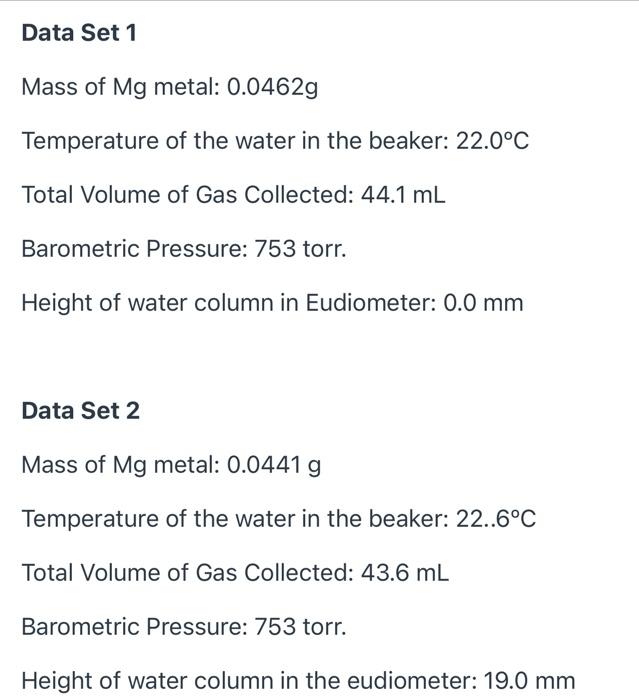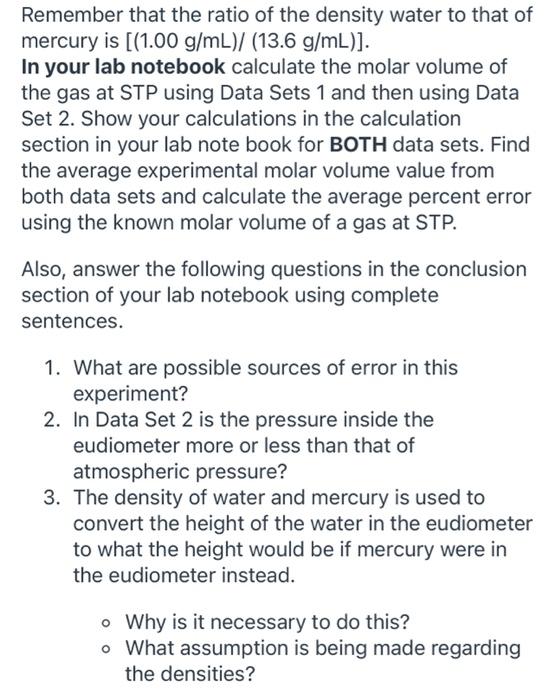Data Set 1 Mass of Mg metal: 0.04629 Temperature of the water in the beaker: 22.0C Total Volume of Gas Collected: 44.1 mL Barometric Pressure: 753 torr. Height of water column in Eudiometer: 0.0 mm Data Set 2 Mass of Mg metal: 0.0441 g Temperature of the water in the beaker: 22..6C Total Volume of Gas Collected: 43.6 mL Barometric Pressure: 753 torr. Height of water column in the eudiometer: 19.0 mm Remember that the ratio of the density water to that of mercury is [(1.00 g/mL)/(13.6 g/mL)]. In your lab notebook calculate the molar volume of the gas at STP using Data Sets 1 and then using Data Set 2. Show your calculations in the calculation section in your lab note book for BOTH data sets. Find the average experimental molar volume value from both data sets and calculate the average percent error using the known molar volume of a gas at STP. Also, answer the following questions in the conclusion section of your lab notebook using complete sentences. 1. What are possible sources of error in this experiment? 2. In Data Set 2 is the pressure inside the eudiometer more or less than that of atmospheric pressure? 3. The density of water and mercury is used to convert the height of the water in the eudiometer to what the height would be if mercury were in the eudiometer instead. o Why is it necessary to do this? What assumption is being made regarding the densities? Data Set 1 Mass of Mg metal: 0.04629 Temperature of the water in the beaker: 22.0C Total Volume of Gas Collected: 44.1 mL Barometric Pressure: 753 torr. Height of water column in Eudiometer: 0.0 mm Data Set 2 Mass of Mg metal: 0.0441 g Temperature of the water in the beaker: 22..6C Total Volume of Gas Collected: 43.6 mL Barometric Pressure: 753 torr. Height of water column in the eudiometer: 19.0 mm Remember that the ratio of the density water to that of mercury is [(1.00 g/mL)/(13.6 g/mL)]. In your lab notebook calculate the molar volume of the gas at STP using Data Sets 1 and then using Data Set 2. Show your calculations in the calculation section in your lab note book for BOTH data sets. Find the average experimental molar volume value from both data sets and calculate the average percent error using the known molar volume of a gas at STP. Also, answer the following questions in the conclusion section of your lab notebook using complete sentences. 1. What are possible sources of error in this experiment? 2. In Data Set 2 is the pressure inside the eudiometer more or less than that of atmospheric pressure? 3. The density of water and mercury is used to convert the height of the water in the eudiometer to what the height would be if mercury were in the eudiometer instead. o Why is it necessary to do this? What assumption is being made regarding the densities








